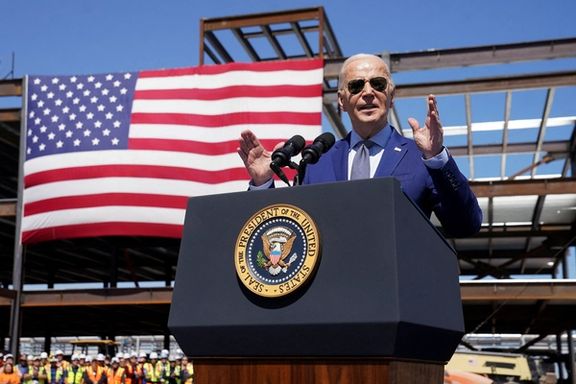Biden Administration Under Fire For Iran Messaging

US Secretary Of State, Antony Blinken has come under fire for his mollycoddling of Iran, requesting they tell the Iran-backed Houthis "to stop" attacks on shipping in the Red Sea.

US Secretary Of State, Antony Blinken has come under fire for his mollycoddling of Iran, requesting they tell the Iran-backed Houthis "to stop" attacks on shipping in the Red Sea.
While the international community looks to the US to take stronger action against the Houthis, Blinken could only voice hopes that Iran would step in to stop the disruptions. “We would like to see Iran exert the influence that it has, because it’s the primary supplier to the Houthis of weapons, of information, of technology. We would like to see them tell the Houthis to stop.
The Red Sea blockade, initiated by the Yemen-based Houthi terror group after Iran’s Supreme Leader asked Muslims to stifle Israeli trade, has seen dozens of attacks carried out on global shipping, including US ships and causing major disruptions to global trade and logistics since November.
Implemented in a bid to force Israel into a ceasefire amid its war in Gaza against Iran-backed Hamas, US led attacks on Houthi infrastructure have as yet failed to deter the militia which are armed with some of the most lethal aerial assault weapons in the region, provided by Iran.
Long branded too soft on Iran’s nuclear activities, the allegations are now haunting the Biden administration as the blockade creates chaos on the vital trade route, with little being done by Washington.
“Meanwhile, we and other countries have no choice but to try to defend the shipping and, as necessary, degrade the assets – the military assets – that the Houthis are using to continue to attack shipping,” Blinken said this week.
He reiterated that the US is imposing sanctions on Iran and its terror entities but in spite of this, Tehran’s nuclear capabilities have only grown in the last year.
“I also don’t think it’s in Iran’s interest to continue to support these Houthi attacks, attacks that, again, are being condemned by countries around the world,” he said, in spite of the fact it was Iran who sparked the blockade, occurring alongside proxy actions from Lebanon, Iraq and Syria. “The extent to which Iran is seen as being responsible for that – I don’t think that’s good for Iran, so we hope that it will use the influence it has to put an end to this.”
State Department spokesman Matthew Miller reiterated talk of sanctions, failing to mention their lack of efficacy in stopping Tehran’s reign of terror. “Iran is always going to fund terrorism,” he said this week. “It’s always going to fund destabilizing activities … And with respect to those illegitimate activities by the Iranian Government, you have seen this administration respond to those. We have imposed sanctions on more than 500 Iranian entities since the outset of this administration. We have held Iran accountable for its support of terrorism and its funding of dangerous proxy groups around the region, and we’ll continue to do so.”
Jason Brodsky, policy director for think tank United Against A Nuclear Iran, slammed the remarks. “Why would Iran's regime have any incentive to ask the Houthis to stop when it hasn't been made to pay any direct cost at home for its support to the Houthis? I'd like to see the State Department understand who they are dealing with here. It's not clear to me they do,” he wrote on X.
In a huge miscalculation, President Joe Biden also enraged Iranians this week, mentioning the war in Gaza when sharing Norouz (Nowruz) messages for the Persian new year. Acknowledging the brave women of Iran, he went on to lament the suffering in Gaza, a cause totally disconnected from the plight facing the millions of Iranians on the poverty line and living under a brutal dictatorial regime.
“I don't know if the people of Iran care about the war in Gaza. As far as they're concerned, people of Iran are suffering because the regime invests in terrorism of Hamas instead of their own wellbeing,” Iranian-American Marjan Keypour said on X.
“Most Iranians blame the Islamic regime's policies toward Syria and "Palestinian" issues for their economic problems, not the US sanctions. It's time for the US officials to stop apologizing and hold tyrants and terrorists accountable for their actions,” she added.
Her sentiments were welcomed by other Iranians whose own plight is far closer to home than the suffering in Gaza amid a war sparked by Iranian regime-backed Hamas on October 7 when the militia invaded Israel killing 1,200 mostly civilians and taking more than 250 more hostage. “I don’t care about Gaza! Let us talk about the situation in Iran!”, responded Azadeh Nikzadeh, also an Iranian-American.
US-based PhD student, Sativa, reacted with fury to the Biden greeting mentioning Gaza, writing on X, “Dear @POTUS It is disrespectful to Iranians when you celebrate their NON-ISLAMIC new year, while paying lip service to their enemy, the Palestinians (who sided with Saddam and killed Iranians, and are now siding with the brutal mullah regime). Have you not seen how Iranians feel about Palestine? Or their flag?”